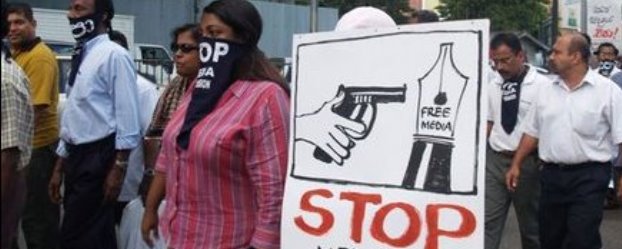On August 24, the Committee to Protect Journalists (CPJ) reported on the arrest of four Sri Lankan army officers on suspicion that they were involved with the January 2010 disappearance of cartoonist Prageeth Ekneligoda. “We are encouraged by progress in the case of Prageeth Ekneligoda. If the government of President Maithripala Sirisena resolves the journalist’s disappearance, the Ekneligoda family will finally be able to find some closure in their long search for justice,” CPJ said.
CPJ might have been encouraged on August 24, but that is no longer the case, even with the arrest of three more Army officers on September 7.
Ekneligoda’s wife, Sandhya, told CPJ that while she welcomes the arrests, she feels the five-year-old case should have moved far beyond where it currently stands. Her greater concern, Sandhya told CPJ, is that what she calls “certain powerful elements” are aggressively trying to derail the investigative process by discrediting Ekneligoda both as a journalist and an individual. The attacks have come through Sri Lanka’s notoriously partisan media.
“They are calling him a LTTE operative. They are saying he was never a journalist. They are destroying his character. They are saying the arrest of the Army officers will jeopardize national security. Even the Attorney General’s Department is throwing up road blocks,” Sandhya told CPJ, referring to media reports about her husband’s case.
“I am only asking for justice. But nobody is willing to do the right thing.” Instead, the single mother said, authorities are harassing her through attacks in the media. “They are playing with me without facing the truth,” she said.
Seeking justice
Alongside the negative reports about her husband are conflicting updates on how police are progressing with the case. Police officials say they are under no pressure to conceal the facts of the case, despite having made no effective movement in more than five and a half years.
But reports quoting police officials say, CID officers investigating the disappearance are facing difficulties due to intimidation by some top defence officials who were close to members of the previous government.
The recent accusations of marital infidelityas the reason for his disappearance are certainly not the first to be made in Ekneligoda’s case. One of the most bizarre accusations is the 2013 claim by Arundika Fernando, an MP, that Ekneligoda and many of the other Sri Lankan journalists who had disappeared over the years were all leading the expat high-life in France.
Earlier, in 2011, Mohan Peiris, who at the time was the senior legal adviser to the Cabinet and would eventually become Supreme Court Chief Justice, said Eknelygoda has taken refuge in a foreign country and that the campaign against his disappearance was a hoax. He called the allegations against the government a “savage smokescreen” at the time. Peiris resigned from the court under pressure less than two weeks after former president Mahinda Rajapaksa was voted out of power.
Such accusations were the way the game was played under the Rajapaksa government. And reading Sri Lankan media in 2015, it appears little has changed, despite hopes for the better under the new reform government. And that is worrisome.
On August 26, the United States announced that it will sponsor a resolution at the United Nations Human Rights Council in Geneva that will back the new government’s plan to conduct its own investigation into possible war crimes during the final stages of the country’s civil conflict and ethnic divide, The New York Times reported.
That stance is a reversal of the Americans’, and many other countries’ position on backing an international procedure. And that reversal might well be a decision that will be carried through. The rationale is that it will give the government some breathing room by lifting international and domestic pressure for it to come to grips with the terrible history of the last 30 years of conflict, which continues to fester not far below the surface. The UNHRC will start its meeting on September 14.
President Sirisena and Prime Minister Ranil Wickremesinghe will be in New York for the United Nations General Assembly, starting on September 16.
Human rights assessment
They will represent a duly elected government, one which has announced a reform agenda of democratically led economic growth, diplomatic realignment, and the intention to try to restore Sri Lanka to its rightful place among modern nations. Their appearance will be a validation of the democratic process.
The 2010 disappearance and apparent death of Ekneligoda is only one case of at least nine cases of targeted journalists that happened during the Rajapaksa government. Unlike the brutal end to the war, these cases do not need to be handled on an international basis. Their deaths can and should be treated as straight forward criminal cases that are thoroughly and openly investigated and prosecuted.
While on an international stage in New York, President Sirisena and Prime Minister Wickremesinghe should make a public pledge that that is what will happen in the case of Sri Lanka’s dead and missing journalists.
And after making that promise, they should see that it happens when they return home. If they cannot deliver on such clear-cut cases, it will be hard to believe they will be able to oversee the difficult revelations linked to the end of their country’s civil conflict involving tens of thousands of deaths. Their credibility is on the line.
About the author:
Bob Dietz is the Asia Program Coordinator for the Committee to Protect Journalists(CPJ)
